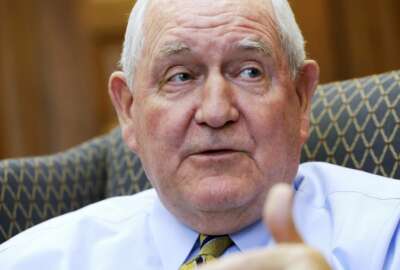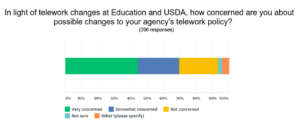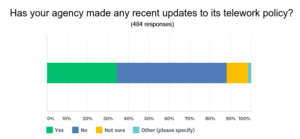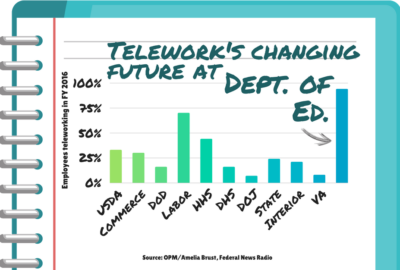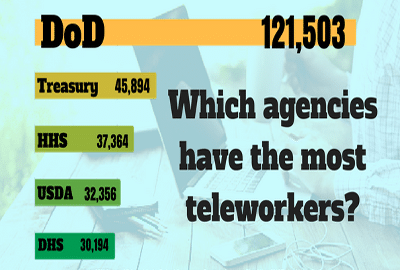
Exclusive
Feds may seek new jobs thanks to growing telework policy changes
In a new, exclusive online survey by Federal News Radio nearly 70 percent of respondents said they are very or somewhat concerned about possible changes to telework...
Best listening experience is on Chrome, Firefox or Safari. Subscribe to Federal Drive’s daily audio interviews on Apple Podcasts or PodcastOne.
The Agriculture Department’s decision in January to make significant changes to how often its employees could telework is reverberating across the government.
The departments of Education and Health and Human Services followed suit over the next few months. There are rumors other agencies, including the Veterans Affairs Department and Commerce Department may soon implement similar changes.
And all of these new policies are causing some federal employees to believe it’s only a matter of time before their agency follows suit.
Federal News Radio conducted an exclusive online survey of its readers over the last month and found 44 percent of 396 respondents say they are very concerned and 25 percent said they are somewhat concerned about possible changes to their agency’s telework policy.
“The management in [VA] is considering decreasing telework or eliminating it,” said one respondent.
Another said, “Telework is now not an option starting Oct. 1st (originally was two days a week).”
Of those who answered how their agency changed the telework policy, a vast majority said it was a straight reduction usually limited to one day per week. One respondent said their agency cancelled any regularly scheduled teleworking, and now only situational is allowed.
Others said their agency clarified policies and procedures around telework, such as “increased monitoring of log on and log out times,” according to one respondent.
Another respondent said, their agency clarified “meanings of ad-hoc, situational and reoccurring as well as expand teleworking to ad-hoc to a maximum of two days per pay period.”
Several also commented that their agency’s policy is if an employee can telework, they must during weather-related situations.
One respondent said their agency “mandated anyone with a telework agreement must work on days where the government is closed, such as snow emergencies.”
And there were a few who said their agency actually is promoting telework.
“Encouraging us to do more telework to save space in office,” stated one respondent.
Another said, “Expanding telework to more employees to telework more than 50 percent of the time.”
It’s clear all of these changes are causing consternation across almost every agency. And what’s unclear is what agencies are doing to alleviate the challenges.
At USDA, Don Bice, the deputy assistant secretary for administration, said while employees had initial concerns about telework, the time since the policy helped clarify the agency’s intent.
“I think the more that we talk about what the Secretary intended and what the authorities are … this did not change any reasonable accommodations and it didn’t change if there were any additional issues, where if there were staffing that had to do with space limitations, it didn’t change that. It’s more the perception there,” Bice said in an interview after a House Oversight and Government Reform hearing in May where Rep. Gerry Connolly (D-Va.) brought up concerns about USDA’s decision. “The secretary still supports telework, still expects people to come to the office most of the time of the days of the week, still allows telework, but it’s matter of a perception on the time periods that people feel comfortable with and what the secretary tried to do was provide to the supervisors the ability to make decisions in conjunction with employees.”
USDA extended the initial timeline to implement the telework policy to 60 days after employees said 30 days was not enough.
Bice said that is an example of how the agency helped with adjustment.
“The secretary asked each one of his policy staff and the people acting in those policy positions to go out and have conversations with their employees to explain the policy. I think that has helped to explain what the intent here is,” he said. “For those people whose job does allow full-time telework, those positions have now been designated to be eligible to be done in other duty stations. The other big component is that we were accurately identifying whether people were doing work from home or doing work from an office location. Certainly, we are fielding lots of questions. Some have been good humored. Some have been not so good humored.”
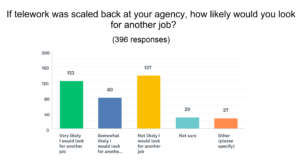 As more and more agencies follow USDA’s lead and require employees to be in the office more days per week, the lack of humor is becoming evident more and more.
As more and more agencies follow USDA’s lead and require employees to be in the office more days per week, the lack of humor is becoming evident more and more.
The good news is 34 percent of the employees who responded to the survey said the change in the telework policy wouldn’t prompt them to look for a new job.
“Already happened. I’m not terribly upset by it,” wrote one respondent.
Another said, “I’ll retire in a couple of years so I won’t be looking for another job because of telework policy.”
At the same time, 31 percent said a change in the telework policy would “very likely” motivate them to look for a new job and 20 percent said they were “somewhat likely” to change positions.
“I have 20 years, so leaving makes no sense, But as soon as eligible for retirement, I will seek other opportunities,” stated on respondent.
Another said, “I’m looking to transfer to another duty station closer to home.”
The short and long term impacts of the policy changes are unclear.
Frank Landefeld, public sector market leader at MorganFranklin consulting, told Your Turn with Mike Causey in March that restricting such work-life policies could make it harder for the federal government to compete for new talent.
That seemed to play out in the survey.
More than half of the respondents said the biggest benefit of telework is it reduces the amount of time they spend commuting, while 25 percent said the biggest benefit is greater work-life balance.
“Ability to have uninterrupted time for heads down work that is not possible in the open office environment,” wrote one respondent.
Another respondent stated, “Less commuting, higher productivity, equal collaboration through instant messaging.”
Overall, the survey showed continued concerns over real or potential changes to federal telework policy. The lack of communication about why the changes are being made and an inconsistent application across agencies is a problem agencies are struggling to address. As USDA’s Bice said, fielding and answering all those questions would do a lot to relieve anxiety.
Copyright © 2025 Federal News Network. All rights reserved. This website is not intended for users located within the European Economic Area.
Jason Miller is executive editor of Federal News Network and directs news coverage on the people, policy and programs of the federal government.
Follow @jmillerWFED
Related Stories
